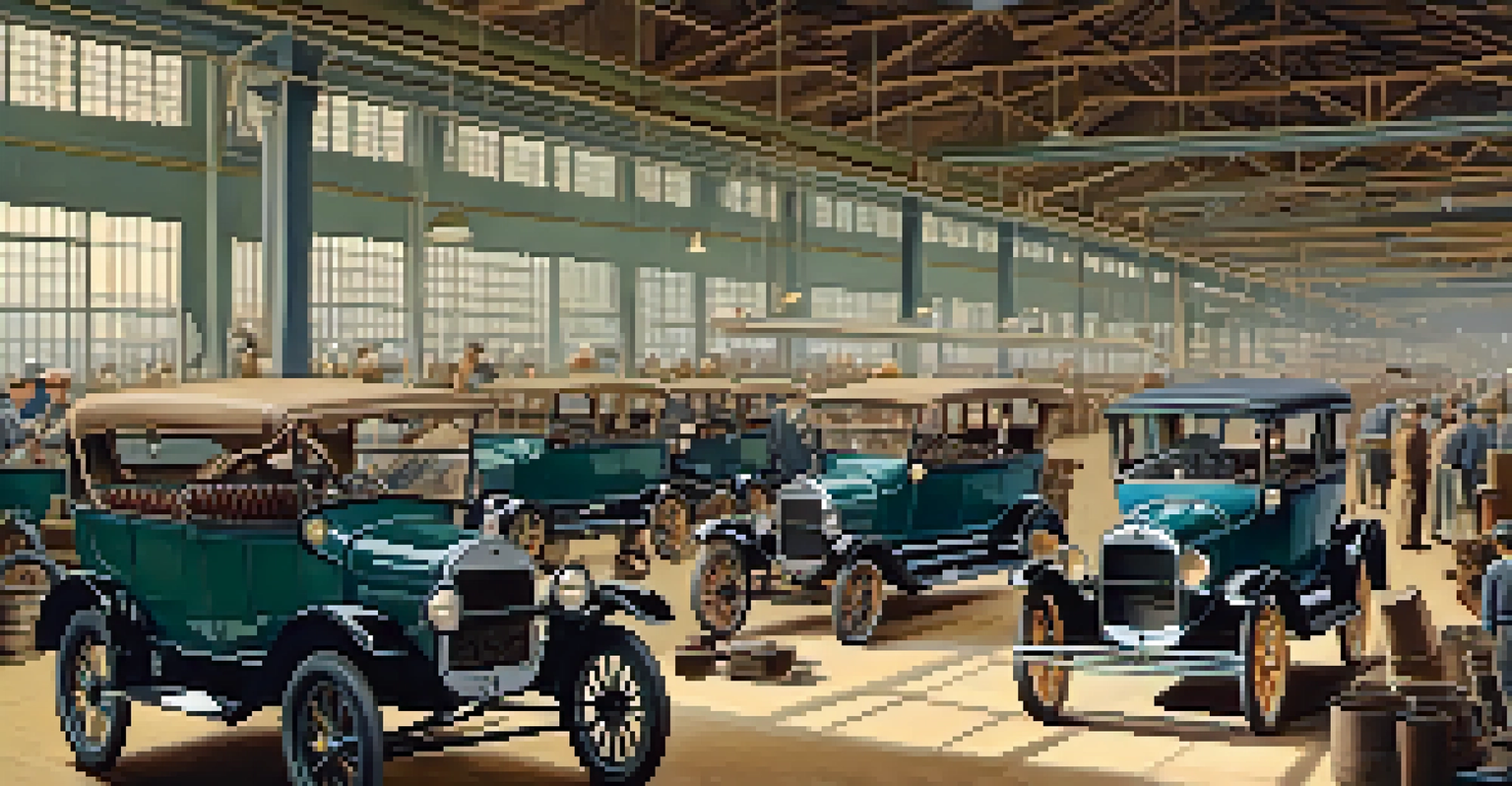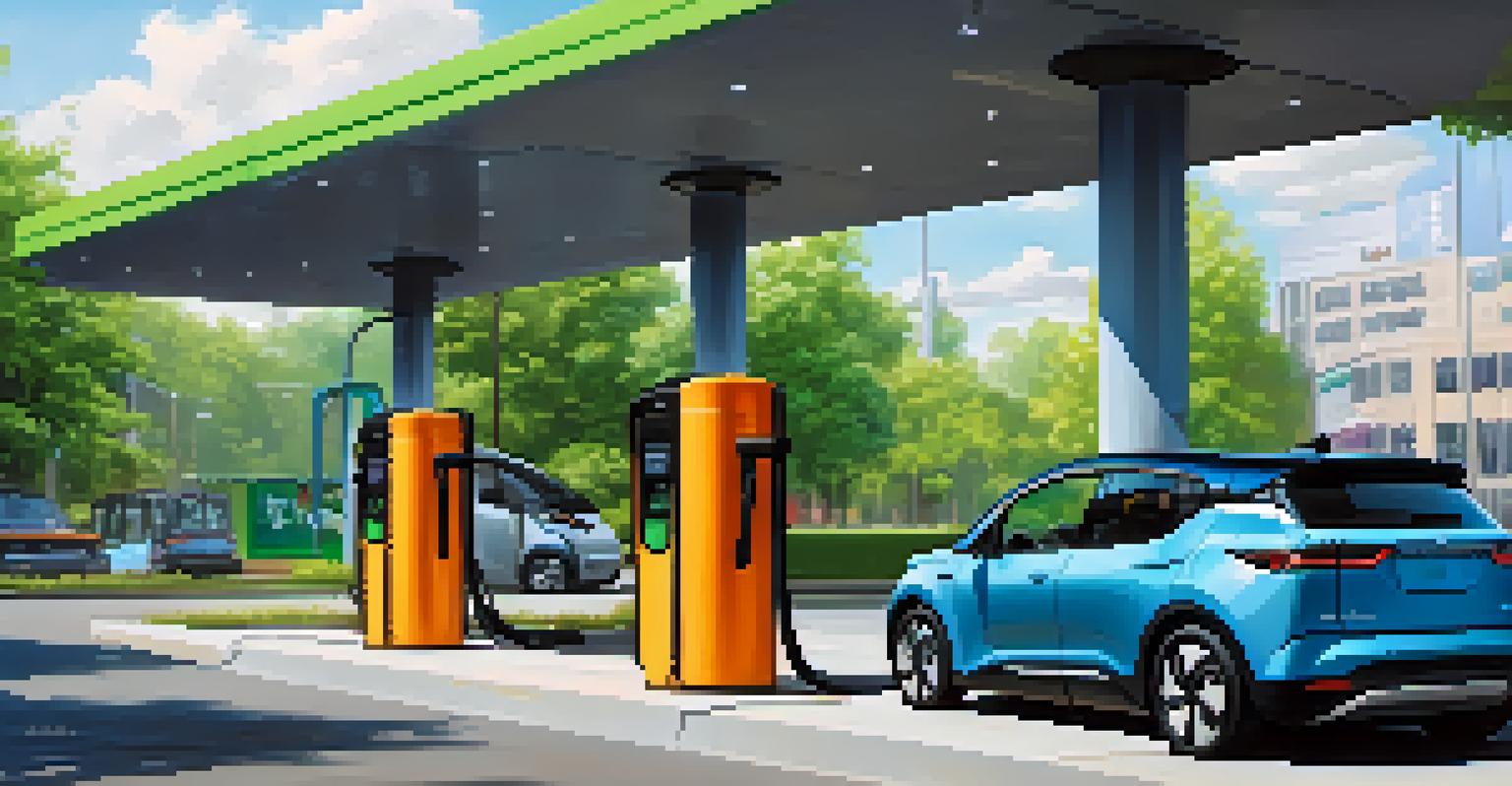Major Automotive Manufacturers That Thrived in Detroit

The Birth of the Big Three: Ford, GM, and Chrysler
Detroit is often referred to as the Motor City, a title earned due to the significant presence of the Big Three automakers: Ford, General Motors, and Chrysler. These companies not only shaped the automotive industry but also transformed the city into a hub of innovation and manufacturing. Each of these manufacturers brought their own unique approach to car-making, contributing to the rich tapestry of Detroit's automotive heritage.
The cars we drive say a lot about us.
Ford revolutionized manufacturing with the assembly line, drastically reducing production time and costs. General Motors, on the other hand, focused on branding and diversifying its vehicle lineup to cater to various consumer preferences. Chrysler carved its niche with engineering innovations and stylish designs, appealing to the burgeoning middle class.
Together, these automotive giants forged a legacy that not only fueled Detroit's economy but also influenced car culture across the globe. Their competitive spirit and commitment to excellence paved the way for future advancements in automotive technology.
Ford Motor Company: A Legacy of Innovation
Founded by Henry Ford in 1903, Ford Motor Company is synonymous with innovation in the automotive world. The introduction of the Model T in 1908 revolutionized personal transportation, making cars accessible to the average American. The company's pioneering assembly line method not only increased production efficiency but also set the standard for manufacturing practices worldwide.

Ford's influence extended beyond just cars; it introduced the concept of paying workers a living wage, which helped boost the economy and build a loyal workforce. This forward-thinking approach created a ripple effect, inspiring other companies to adopt similar practices, ultimately shaping labor relations in the industrial sector.
Detroit: Home of the Big Three
Ford, GM, and Chrysler shaped Detroit's automotive legacy through innovation, branding, and engineering excellence.
As the years progressed, Ford continued to innovate with models like the Mustang and F-150, solidifying its place in automotive history. The company's commitment to sustainability and electric vehicles today ensures that it remains a key player in the ever-evolving landscape of transportation.
General Motors: A Diverse Automotive Powerhouse
General Motors (GM) has been a cornerstone of Detroit's automotive scene since its founding in 1908. With a diverse portfolio including brands like Chevrolet, Cadillac, and Buick, GM catered to a wide range of consumers and preferences. This adaptability allowed GM to thrive even during challenging economic periods, showcasing its resilience in a fluctuating market.
Automobiles are no longer a luxury; they are a necessity for everyday life.
One of GM's significant contributions to the automotive industry was the introduction of the concept of annual model changes, enticing consumers to purchase new vehicles more frequently. This strategy not only kept the brand fresh in the minds of consumers but also drove competition among automakers, ultimately benefiting buyers.
In recent years, GM has pivoted towards electric and autonomous vehicle technologies, setting ambitious goals for sustainability. Their commitment to innovation is a testament to their ability to evolve, ensuring that GM remains relevant in a rapidly changing industry.
Chrysler: Style and Performance Combined
Chrysler, established in 1925, is known for blending style with performance, creating vehicles that resonate with consumers seeking both aesthetics and functionality. The introduction of the Chrysler Airflow in the 1930s marked a significant leap in automotive design, influencing future generations of vehicles. This model emphasized aerodynamics and sleek lines, showcasing Chrysler's commitment to innovation.
Throughout its history, Chrysler has been at the forefront of engineering advancements, including the introduction of the first mass-produced minivan in the 1980s. This innovation not only transformed family transportation but also created a new market segment that competitors quickly followed.
Shift to Electric Vehicles
Detroit is embracing the electric vehicle revolution, with major automakers investing heavily in sustainable technologies.
Despite facing financial challenges in the early 2000s, Chrysler's resilience and ability to adapt led to a successful merger with Fiat, expanding its global reach. Today, Chrysler remains a symbol of American ingenuity, continuing to produce celebrated vehicles that combine style, performance, and technology.
The Rise of Foreign Automakers in Detroit
While the Big Three dominated the automotive landscape, the rise of foreign manufacturers in Detroit has added a new layer of competition and innovation. Companies like Toyota, Honda, and BMW established plants in the Detroit area, contributing significantly to the local economy. Their presence has led to a fusion of ideas and practices, enriching the automotive culture in the city.
These foreign automakers brought new production techniques and management styles, which have influenced the traditional practices of domestic manufacturers. For instance, Toyota's Just-In-Time production system has been widely adopted, improving efficiency across the industry. This collaboration has fostered a spirit of innovation that benefits consumers and manufacturers alike.
As competition intensified, the Big Three were compelled to elevate their game, leading to better quality vehicles and enhanced customer satisfaction. The automotive landscape in Detroit has evolved into a melting pot of ideas, showcasing the strength of collaboration in driving industry advancements.
Detroit’s Role in the Electric Vehicle Revolution
Detroit is at the forefront of the electric vehicle (EV) revolution, with major automakers pivoting towards sustainable solutions. Companies like Ford and GM are investing billions in electric vehicle technology, aiming to lead the charge in this transformative shift. This commitment not only reflects changing consumer preferences but also addresses urgent environmental concerns.
The city's rich automotive history positions it uniquely to adapt to this new era, as it has a wealth of engineering talent and manufacturing expertise. With the establishment of EV-focused facilities, Detroit is becoming a hub for electric vehicle production, attracting investments and creating jobs in the process.
Challenges and Resilience
Despite economic downturns and rising competition, Detroit's automotive industry continues to adapt and innovate.
As the demand for electric vehicles continues to rise, Detroit is poised to reclaim its status as a leader in the automotive industry. This shift not only fosters innovation but also contributes to a more sustainable future, ensuring that Detroit remains at the heart of automotive progress.
Challenges Faced by Detroit's Automotive Industry
Despite its storied history, Detroit's automotive industry has faced numerous challenges over the decades. Economic downturns, rising competition, and shifts in consumer preferences have tested the resilience of automakers in the region. The 2008 financial crisis was particularly devastating, leading to significant restructuring and even bankruptcies among major manufacturers.
In recent years, the rise of technology-driven companies and the push for electric vehicles have forced traditional automakers to rethink their strategies. Companies must now compete not only with each other but also with tech giants entering the automotive space, creating a complex landscape for innovation and adaptation.

However, Detroit's ability to reinvent itself has been a source of hope. The commitment to innovation and collaboration among manufacturers, local government, and educational institutions is paving the way for a brighter future, ensuring that the Motor City remains a vital player in the global automotive industry.
The Future of Detroit's Automotive Landscape
Looking ahead, the future of Detroit's automotive industry is filled with potential and promise. With a strong focus on electric and autonomous vehicles, the city is poised to lead in the next generation of transportation solutions. Automakers are increasingly investing in research and development to enhance vehicle technologies, aiming for safer, cleaner, and smarter options for consumers.
Moreover, the collaboration between automakers, tech companies, and local universities is fostering an environment ripe for innovation. This synergy is essential for tackling the challenges posed by rapid technological advancements and shifting consumer needs. Detroit's commitment to education and workforce development will ensure that the region has the talent necessary to thrive in this new era.
As Detroit embraces its role in the future of transportation, the city stands as a testament to resilience and adaptability. With a rich history and a forward-thinking mindset, Detroit is not just the Motor City; it is the heart of the automotive industry's evolution.